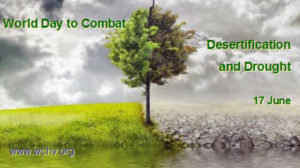 Desertification is the degradation of land in arid, semi-arid and dry sub-humid areas. It is caused primarily by human activities and climatic variations. Desertification does not refer to the expansion of existing deserts. It occurs because dryland ecosystems, which cover over one third of the world‘s land area, are extremely vulnerable to overexploitation and inappropriate land use. Poverty, political instability, deforestation, overgrazing and bad irrigation practices can all undermine the productivity of the land.
Desertification is the degradation of land in arid, semi-arid and dry sub-humid areas. It is caused primarily by human activities and climatic variations. Desertification does not refer to the expansion of existing deserts. It occurs because dryland ecosystems, which cover over one third of the world‘s land area, are extremely vulnerable to overexploitation and inappropriate land use. Poverty, political instability, deforestation, overgrazing and bad irrigation practices can all undermine the productivity of the land.
The World Day to Combat Desertification and Drought is observed every year to promote public awareness of international efforts to combat desertification. The day is a unique moment to remind everyone that land degradation neutrality is achievable through problem-solving, strong community involvement and co-operation at all levels
Background
In December 1994, the United Nations General Assembly declared June 17 the World Day to Combat Desertification and Drought. The assembly acknowledged that desertification and drought were global problems because they affected all regions of the world. The assembly also realized that joint action by the international community was needed to combat desertification and drought, particularly in Africa.
States were invited to devote the World Day to promoting awareness of the need for international cooperation to combat desertification and the effects of drought, and on the implementation of the Convention to Combat Desertification. Since then, country parties to the United Nations Convention to Combat Desertification (UNCCD), non-governmental organizations and other interested stakeholders celebrate this particular day with outreach activities worldwide on June 17 each year.















